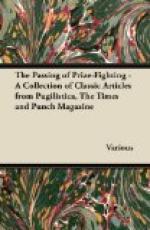And all the time looks every inch
The Hero of that Summer Sale!
For oh! a King of Men is he—
Whom shop-assistants call to “Sign!”
So his, and his alone, shall be
This fondly foolish heart of mine!
* * * * *
MONDAY, Jan. 18, 1892. “Bath and West of England’s Society’s Cheese School at Frome.” Of this School, the Times, judging by results, speaks highly of “the practical character of the instruction given at the School.” This is a bad look-out for Eton and Harrow, not to say for Winchester and Westminster also. All parents who wish their children to be “quite the cheese” in Society generally, and particularly for Bath and the West of England, where, of course, Society is remarkably exclusive, cannot do better, it is evident, than send them to the Bath and West of England Cheese School.
* * * * *
ON THE TRAILL.—It is suggested that in future M.P. should stand for Minor Poet. Would this satisfy Mr. LEWIS MORRIS? Or would he insist on being gazetted as a Major?
* * * * *
OUR BOOKING-OFFICE.
[Illustration: The following Page.]
One of the Baron’s Deputy-Readers has been looking through Mr. G.W. HENLEY’s Lyra Heroica; a Book of Verse for Boys. DAVID NUTT, London.) This is his appreciation:—Mr. HENLEY has tacked his name to a collection which contains some noble poems, some (but not much) trash, and a good many pieces, which, however poetical they may be, are certainly not heroic, seeing that they do not express “the simpler sentiments, and the more elemental emotions” (I use Mr. HENLEY’s prefatory words), and are scarcely the sort of verse that boys are likely, or ought to care about. To be sure, Mr. HENLEY guards himself on the score of his “personal equation”—I trust his boys understand what he means. My own personal equation makes me doubt whether Mr. HENLEY has done well in including such pieces as, for instance, HERBERT’s “Memento Mori,” CURRAN’s “The Deserter,” SWINBURNE’s “The Oblation,” and ALFRED AUSTIN’s “Is Life Worth Living?” If Mr. HENLEY, or anybody else who happens to possess a personal equation, will point out to me the heroic quality in these poems, I shall feel deeply grateful. And how, in the name of all that is or ever was heroic, has “Auld Lang Syne” crept into this collection of heroic verse? As for Mr. ALFRED AUSTIN, I cannot think by what right he secures a place in such a compilation. I have rarely read a piece of his which did not contain at least one glaring infelicity. In “Is Life Worth Living?” he tells us of “blithe herds,” which (in compliance with the obvious necessities of rhyme, but for no other reason)
“Wend homeward with unweary feet,
Carolling like the birds.”




